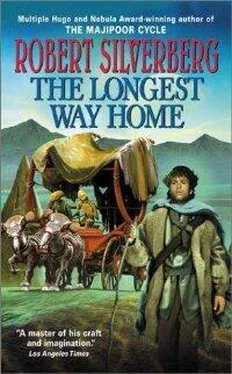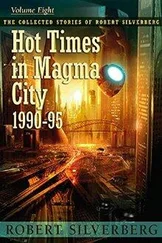It was not pleasing to be walking on a paved surface again, though. The highway felt harsh, even brutal, against his sandaled feet. He was tempted to go take the sandals off and go barefoot on it. I am becoming a creature of nature, he thought, a wild thing, a beast of the fields. My identity as a civilized being is dropping away from me day by day. I have become a shaggy animal. If I ever do get home, will I be able to turn myself back into a Master again? Or will I slip away from House Keilloran when no one is looking, and go off by myself to forage for berries and roots in the wilderness beyond the estate?
There were traces in this district of former settlement: a scattering of small wooden houses of the sort he had lived in at Eysar Haven, but isolated ones, set one by one at goodly distances from each other at the side of the road. They were the homes of individual Folkish farmers, he supposed, who had not wanted to live in a village, not even a cuyling village. None of them was occupied, though there was no sign of any destruction: apparently their owners had just abandoned them, he could not tell how long ago. Perhaps the war had come this way, or perhaps those who had lived here had just gone away: it was impossible to tell.
Joseph prowled around in one that had a wire bird-coop alongside the main building, the sort in which thestrins or heysir would have been kept. There was at least the possibility that some remnants of the farmer’s flock might still be in residence there. His supply of meat was nearly at its end and it would be splendid to dine on roast thestrin tonight, or even an omelet of heysir eggs. But Joseph found nothing in the coop except empty nests and a scattering of feathers. Inside the farmhouse itself a thick layer of dust coated everything. The building had been emptied of virtually all it had once contained except for some old, shapeless furniture. Joseph did discover a single incongruous unopened bottle of wine standing at the edge of a kitchen counter. He had nothing with which to open it, and finally simply snapped its neck against the side of the rust-stained sink. The wine was thin and sour and he left most of it unfinished.
That night a light rain began to fall. Joseph decided to sleep inside the house, but he disliked the confined feeling that sleeping indoors produced in him, and the drifting clouds of dust that he had stirred up were bothersome. He slept on the porch instead, lying on some bedraggled old pillows that he found, listening to the gentle pattering sound of the rain until sleep took him.
The morning was bright, clear, and warm. He allowed himself a quick, minimal breakfast and set out early, and soon was beyond the last of the abandoned farmhouses. He was moving into a terrain that was neither forest nor meadow, dominated by immense stately trees with steeply upturned branches, each standing in splendid isolation, far from its nearest neighbor, amidst a field of dense, rubbery-looking pink-leaved grass. A myriad of small round-bodied hopping creatures with fluffy grayish fur moved about busily below the trees, probably searching for seeds.
The sight of them in such a multitude made Joseph, who had begun to see that he would need to restock his food supply in another day or two, feel a burst of sudden hunger. He yearned for a rifle. The best he could hope for, though, was to try to bring one down with a well-aimed rock. But as he crept up on one group of them with what he hoped was something like stealth they melted away before him like winter fog in the bright morning sun, easily and unhurriedly drifting out of his range as Joseph approached them, and resumed their explorations at the far side of the field. A second group did the same. Joseph gave the enterprise up without casting a single stone.
His mood was cheerful, nevertheless. This was an inviting kind of countryside and he did not doubt that he would find something to eat somewhere, sooner or later, and his body felt so well tuned now, so smoothly coordinated in every function, that there was real joy to be had from striding along down the empty road at a brisk pace. The sun stood high in the sky before him, showing him the way to Helikis. Joseph felt that it did not matter if it took him another whole year to get home, three years, ten years: this was the great adventure of his life, the unexpected epic journey that would shape him forever, and however much time it required would be the span that his destiny had marked out for it to last.
Then he came around a curve in the road, still moving jauntily along, whistling, thinking pleasant thoughts of his nights with Thayle, and discovered that the road just ahead was full of military-looking vehicles, perhaps half a dozen of them, with a crowd of armed men standing alongside them.
A roadblock, Joseph realized. A checkpoint of some kind. And he had walked right into it, or nearly so.
Had they seen him? He could not tell. He halted quickly and turned about, meaning to slip back the way he had come, thinking to hide himself in the woods until they moved along, or, if they didn’t move along, to take up a lateral trail that would get him around them. He succeeded in covering about a dozen paces.
Then a voice from somewhere above him, a crisp, flat, nasal voice, said in Folkish, “You will stay exactly where you are. You will lift your hands above your head.”
Joseph looked up. A stocky helmeted man in a drab uniform stood on the hillside overlooking the highway. He had a rifle in his hands, aimed at the middle of Joseph’s chest. Several other men in the same sort of uniform were jogging around the bend in the road toward him. They were armed also.
Any movement other than one of surrender would be suicidal, Joseph saw. He nodded to the man on the hillside and held up his hands.
They came up to him and formed a little cluster about him. Rebel soldiers, he supposed, five of them altogether. Not one came up much higher than his shoulders. All five had the same flat broad noses, narrow grayish eyes, yellowish hair that looked as though it had been cut by snipping around the edges of an inverted bowl. They might almost have been five brothers.
He heard them chattering quickly in Folkish, arguing over him, trying to decide who and what he was. The prevailing belief among them seemed to be that he was a spy, although for whom they thought he might be spying was not something Joseph was able to determine. But one of them thought he was a wandering wild man of the woods, a harmless crazy simpleton. “Only a crazy man would come along this road right now,” he said. “And look how filthy he is. Did you ever see anyone who looked as filthy as this one?” Joseph took some offense at that. It was only a few weeks since he had last trimmed his beard and his hair, and not a great many days had gone by since he had last washed himself, either. He thought he appeared respectable enough, considering his recent circumstances. Yet these soldiers, or the one who had said it, at least, saw him quite differently. This latest sojourn in the wilderness must have left him far more uncouth-looking than he suspected.
He said nothing to them. That seemed the wisest policy. And they made no attempt whatever to interrogate him. Perhaps at their level of authority they had no responsibility for questioning prisoners. Instead they merely bundled him unceremoniously into one of the vehicles parked by the side of the road and headed off with him toward the south.
A sprawling encampment lay ten minutes down the road: wire-mesh walls encircling dozens of flimsy-looking, hastily flung-up huts, with scores of Folkish soldiers wearing the rebel uniform moving around busily within it. At the gate Joseph’s five warders surrendered him, with a muttered explanation that Joseph could not hear, to two others who seemed to be officers of a higher rank, and they gestured to Joseph to follow him within.
Читать дальше












